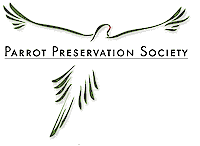 |
| Home |
| Who We Are |
| Save The Parrots |
| Books |
| Links |
| Volunteers |
| Articles |
| Avian Vet Listing |
| Email Us |
Board of Supervisors says Point Arena parrots have got to go
By GLENDA ANDERSON
The Daily Journal
The parrot-breeding operation in Point Arena will have to go, county supervisors ruled Monday.
The 4-1 decision upholds an October Planning Department determination that parrots are not an agricultural product and cannot be located on agricultural land. The owners of the Parrot Preservation Society - Barbara and Geoffrey Gould - plan to fight the decision, which they say was instigated by neighboring turkey ranchers. Nicholas Turkey Breeding Farms objected to the parrots, saying they pose a disease risk. The Goulds say disease is not a problem and that the issue is one of property rights.
They're filing a federal lawsuit.
They're also considering giving their property to the Point Arena band of Pomo Indians, then leasing it back in order to circumvent local planning laws. "When you're right, you're right," said Geoffrey Gould of their determination to continue the operation. He said he talked to the Pomo tribal chairman several months ago about the issue and he was sympathetic.
The Planning Department already has issued the Goulds a parrot eviction notice. It was put on hold until the appeal. Second District Supervisor and board Chairman Richard Shoemaker said the decision does not mean the county is against parrots. "It sounds like a great operation," he said. It just can't be located in a zone that is limited to agricultural uses. The definition of an agricultural product is that it must be used for food or fiber, Shoemaker noted. He said he's disappointed the Goulds would try to circumvent local laws by giving the property to the Pomos. "It certainly shows a lack of sensitivity to the issues of the community," Shoemaker said. He also said the issue points out some shortcomings in the planning process. Shoemaker said any new business in an agriculture zone should trigger a use permit application. That way, the turkey ranchers would have known about the parrots before they moved in and there would have been an early forum in which to discuss possible problems.
While it wasn't a determining issue, University of California poultry specialist Francine Bradley reported Monday that the parrots could pose a health risk to the turkeys, and vice versa. She's said in past interviews that even a threat of disease could wreak financial disaster on the country's turkey industry, for which Nicholas reportedly supplies 50 percent of the turkey breeding stock. If, for example, a person contracted a bird-borne disease, like psittacosis, and owned a parrot, the state would start a search for the bird's origin. If the bird was traced to the Parrot Preservation Society, it could cause problems for the adjacent turkey farm, even if there was no apparent disease at either the parrot or turkey facilities, Bradley said. Whether out of real fear or politics, foreign customers could then refuse all imports of birds that originated at Nicholas' farms.